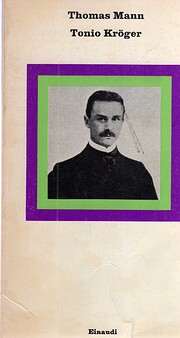

Click on a thumbnail to go to Google Books.
|
Loading... Tonio Krg̲er (original 1903; edition 1993)by Thomas Mann
Work InformationTonio Kröger by Thomas Mann (1903)

Thomas Mann es un escritor excepcional, no cabe duda. Su estilo es tan musical y lleno de vaivenes rítmicos que gusta dejarse llevar por el ritmo de las palabras. Sin embargo, Tonio Kröger es una novelita para separarnos de su personaje, para entender que no nos podemos acercar a él. Su protagonista, este Tonio Kröger, es un personaje que cada vez que se acerca a un conflicto emocional enraizado con su pasado, se monta un discurso grandilocuente para darse por satisfecho en su elección de ser un hombre aburguesado, elevado a la altura de la poesía y visto por los demás como alguien "importante". Nada más lejos de la realidad, ya que todo se termina maquinando narrativamente como una estructura perfecta para poder ver la verdad de un ser aquejado por expectativas rotas en la niñez y la adolescencia, que se miente a sí mismo para sentirse parte de esos rubios de ojos azules que alaba por pura envidia. Es un personaje aquejado de un desprecio a su condición de mestizaje, a su tez morena propia de un natural del Mediterráneo. Es un personaje que busca la huida al ideal romántico del Norte y creerá disfrutar de aquella evanescencia de lo que significa su ciudad natal, sus recuerdos patéticos de niñez, sus expectativas rotas de conexión con sus dos amores del pasado, descubiertos en un baile que se idealiza pese a ser una coreografía de formalidades ridículas que nadie ve con excesiva felicidad. En definitiva, Tonio Kröger se encuentra atrapado por la narración, por esa afirmación autoindulgente de su idealizada condición burguesa. Ni su confidente amiga, la bohemia polaca Lisaveta, lo conseguirá desprender de sus idilios febriles que no le dejan vivir viviendo, sino no-vivir pensando que vive. Y a pesar de todo, de que no es una lectura que busque una conclusión satisfactoria y que se empeñe en sacarnos del personaje para verlo en su realidad más cruda; es esta sorpresa como lectores y el interés que genera cuando entendemos que ese "no he entendido nada", en realidad es un "me gustaría haber visto algo que no había, pero ha sido interesante que me saquen del personaje para que sea crítico con él y vea lo absurdo e irónico que es todo". In this 1903 novella, Mann picks up a slightly different version of the autobiographical character from Buddenbrooks as a schoolboy in Lübeck, torn between the traditions of his mercantile, Nordic father and his flighty, artistic, Latin mother. The fourteen-year-old Tonio is hopelessly in love with the magnificent, blond, blue-eyed Hans, the character who would be Captain of the First XI in a British school story of the time; two years later he is pining for the equally unattainable (but rather more sketchily described) blonde Inge, the doctor's daughter. We skim a few years ahead to the artistic south (Schwabing, the arty quarter of Munich at the time), where Tonio is now an acclaimed poet and is rather pompously lecturing his painter-friend Lisaweta on the demands creative work makes of the artist. She doesn't seem to mind: they didn't have podcasts in those days, and it's something to listen to as she paints. But her comment that Tonio is really still bourgeois under his aesthetic varnish throws him slightly off-balance, and he decides to make a journey back home to explore his relationship to his Baltic roots. When Tonio's quiet Danish seaside hotel is invaded by a party of noisy weekenders, he notices a couple of teenagers who look exactly like Hans and Inge, and watching them dancing together in the evening he comes to the conclusion that the only way forward for him as an artist is to find a way to embrace his bourgeois side at the same time as pursuing his abstract, aesthetic ambitions. This doesn't seem to provide him with a way to embrace either Hans or Inge, though... Interesting, as it's clearly a very personal document in which Mann tries to work out a dichotomy in his nature as an artist that he never really did resolve, and which is perhaps one of the most interesting things about him as a writer of his time. no reviews | add a review
Is contained inHas as a studyHas as a commentary on the textHas as a student's study guideHas as a teacher's guide
A title in the Bristol Classical Press German Texts series, in German with English notes, vocabulary and introduction. Thomas Mann (1875-1955), was awarded the Nobel Prize for literature in 1929, and "Tonio Kroger" occupies a central position in his spiritual and artistic development. A study of youth, it draws together many strands of his life and work: the duality of his parentage; his abhorrence of discipline; and the influence of Schopenhauer and Wagner on his early phase of writing. No library descriptions found. |
Current DiscussionsNonePopular covers
 Google Books — Loading... Google Books — Loading...GenresMelvil Decimal System (DDC)833.912Literature German & related literatures German fiction 1900- 1900-1990 1900-1945LC ClassificationRatingAverage: (3.68) (3.68)
|
||||||||||||||||||||||||||||||||||||||||||||||||||||||||||||||||||||||||||||||||||||||||||||||||||||||||||||||||||||||||||||||||||||||||||||||||||
Krijimtaria shumë e pasur e autorit plotëson, nga titulli në titull, atë njohje të natyrës njerëzore, pa të cilën njeriu i kohës sonë do ta kuptonte më pak vetveten. Natyra e tij kërkuese, që synon t’u shkojë gjërave deri në fund, ndjenja e realitetit dhe lidhja me traditat e shëndosha të kulturës e të letërsisë gjermane e botërore.
Për nobelistin njerëzimi ndahet në dy kategori: në njerëz të lumtur, që s’kanë kërkesa shpirtërore, e në njerëz të trishtuar, që vuajnë nga shkaku i këtyre kërkesave. Tonio Krëgeri eksploron temat e artit në jetën e përditshme dhe largimin nga realiteti